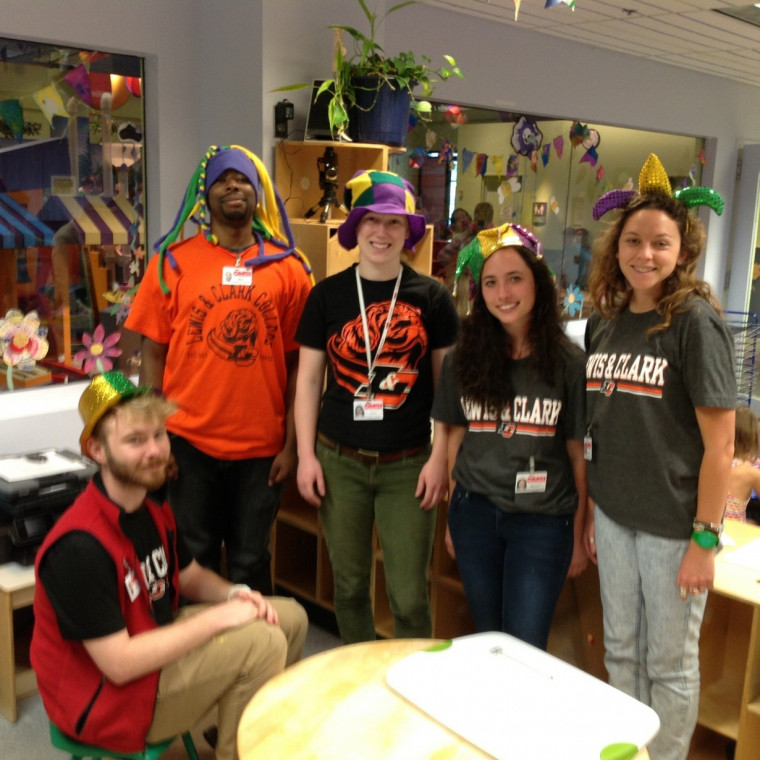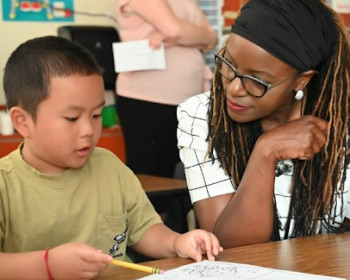Students use games to increase problem solving skills in children
Open gallery

During the summer, Lewis & Clark students continue to work hard in their fields of study. By collaborating with faculty on research projects, students are able to engage their curiosity, expand their learning, and prepare for life after college, all while making meaningful contributions to scholarship.
Desiree Etzel ’14, Marjorie Pichon ’14, and Steven Lucas ’13 are working with Associate Professor of Psychology Erik Nilson to research games that foster problem solving skills in young children. In the following Q&A, the team members reflect on their experience.
What are you researching? What question or problem are you trying to answer/solve with your research?
In our study we use the toy Ball of Whacks, which consists of pyramid shaped magnetic blocks. We believe that playing with this toy will help build creativity and problem solving skills in young children. We’re observing convergent play, which requires one correct solution, and divergent play, in which there are many possible solutions. The two main questions we are investigating are: Will the order of playing convergent and divergent games affect the child’s performance? And, will naming his or her creations impact the number or accuracy of creations he or she makes? We believe that the act of play, and especially open ended play construction, will transfer to real world problem solving situations and creativity.
Does your research have any potential applications in the real world, or will it influence other work in your field?
The structures of society in our modern world, especially in educational environments, often create a number of barriers to developing and holding on to the creativity that it is innate in human beings. Part of our research is to explore ways to overcome these barriers and to find methods to nurture and develop a child’s natural creative instincts.
Is any of your research taking place off campus? If so, what’s that experience like?
We spend three hours, twice a week, conducting research with 3- to 6-year-olds at the Oregon Museum of Science and Industry’s living laboratory. It has been a very fun, rewarding experience. We love interacting with the public and bringing scientific research to them in a format that is easy to understand.
What first sparked your interest in this research area?
After taking courses in cognitive psychology and child development, we became interested in how the two fields of study could interact and the implications this might have on educational strategies and reform.
How has working closely with faculty influenced your education?
This opportunity has given us a first hand look at the research process. Additionally, it has been interesting learning about our own professors’ research outside of a classroom setting, which becomes much more intimate and tactile. This has played a vital role in shaping our plans for the future and prompting us to start thinking about grad school.
How do you hope your experiences this summer will impact your future studies or professional pursuits?
Having this experience will help us decide which direction we want to take after graduation, such as continue what we’re researching in higher education or go into a different subfield of psychology. It has also helped us determine whether we want to continue being involved in research or if we want to take a more clinical approach to psychology.
Anything else you’d care to add?
Aside from the creativity project in kids, we’re also working to develop a study based on motivating healthy behaviors through technology, such as pedometers or video games. At this point we’re just gathering background information and will hopefully have a clear direction for the study by the end of the summer.
About the program
The John S. Rogers Science Research Program allows students to participate in graduate-level research with an emphasis on strengthening their communication skills by requiring them to present their findings. This summer, 40 students are pursuing topics that range from artificial intelligence and motivating behavior to holographic tweezers and zebra fish. Working closely with peers and faculty members, students undertake research questions and present their work in two public venues.
“We’re not asking you, ‘What’s the answer?’ We’re saying, ‘What’s the question?’” said Michael Broide, director of the Rogers program and chair of the physics department. “I think what sets our program apart is that regardless of what project you are on, we’re all going to come together as a group to present what we’re doing in as accessible a way as possible. In science, it’s such an important skill to be able to explain cogently what you’re doing.”
Students make their final research presentation at the Rogers summer science poster session, held in conjunction with the Science Without Limits Symposium. Scheduled for September 18, the poster session is free and open to the public.
Department of Psychology Rogers Summer Research Projects
Zibby Pillote ’14 contributed to this story.
More Newsroom Stories
Public Relations is located in McAfee on the Undergraduate Campus.
MSC: 19
email public@lclark.edu
voice 503-768-7970
Public Relations
Lewis & Clark
615 S. Palatine Hill Road MSC 19
Portland OR 97219

